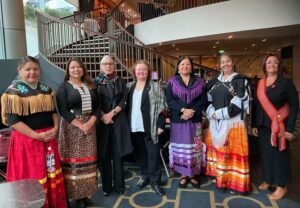Canada-New Zealand collaboration on Indigenous trade issues and inter-governmental a powerful catalyst for change

By Rick Garrick
NEW ZEALAND — Waubetek Business Development Corporation’s Dawn Madahbee Leach shared Waubetek’s model with the Māori during a late August visit to Aotearoa-New Zealand with Indigenous Services Canada Minister Patty Hajdu and other Indigenous leaders.
“There’s a lot of iwi-owned, or community owned, businesses there — they have a lot of land tenure in these iwis, they have fisheries-related businesses, they have sheep farming, which was very interesting — and tourism,” says Madahbee Leach, general manager at Waubetek and chairperson of the National Indigenous Economic Development Board. “One of the things they really want to develop is the individual entrepreneurs, so they were really interested in the model of the Waubetek Business Development Corporation. They want to support individual entrepreneurship in a way similar that we do, so they’re interested in forming a network of Māori financial institutions based on the model of Waubetek. The majority of the businesses that Waubetek invests in are individual entrepreneurs, although we do also invest in community-owned businesses.”
Madahbee Leach says the Māori have a lot of health services set up as businesses.
“They have Māori doctors who have their own clinics, which was quite interesting,” Madahbee Leach says. “They have their own pharmacies, we also have that here, but it was really interesting in how they have several doctors working together in a community.”
Madahbee Leach says the clinics also provide help with food security.
“Community [citizens] can go in and access food if they require it, so it’s sort of like a food bank,” Madahbee Leach says.
Madahbee Leach says one of her highlights was when she taught a women’s hand drum song to the delegation from Canada, noting that the Māori had performed songs for them in every community they visited.
“We even had Minister Hajdu and the High Commissioner Joanne Lemay also learn to sing in [Anishinaabemowin] and sing with us,” Madahbee Leach says. “We wanted to gift the Māori people with our singing as well, and we did pretty good.”
Madahbee Leach says the deepening of the Canada-New Zealand relationship on Indigenous trade issues and inter-governmental collaboration is a powerful catalyst for change.
“Both Canada and New Zealand are beginning to understand the value and complexities of Indigenous knowledge and kinship,” Madahbee Leach says. “Indigenous and non-Indigenous communities alike prosper when Indigenous jurisdiction and authority, and cultural values and languages are affirmed and celebrated; when fair solutions to land-related claims are implemented, and when reliable community infrastructure is realized. Sharing knowledge in partnership and increasing the participation of Indigenous Peoples within the domestic economy and international trade will benefit all of Canada and New Zealand. The relationships we create and nourish today between the Indigenous peoples of Canada and the Māori of Aotearoa-New Zealand will help ensure the wellness of our future generations.”
Hajdu, MP for Thunder Bay-Superior North, says leading the delegation of Indigenous women was inspiring and moving, and helped to strengthen and build new relationships with the people of Aotearoa-New Zealand.
“Our meetings with Māori, government agencies and local communities taught us so much, and reaffirmed the need to continue our work to honour, respect and uphold the rights of Indigenous peoples,” Hajdu says. “Our newly signed Indigenous Collaboration Arrangement will create formal ways for our two countries to do this work together. Tēnā koutou to all who welcomed us so warmly to Aotearoa-New Zealand, and to the Indigenous delegation who joined us on this trip. We have learned a lot from each other. Now we go forward to create better futures for the next generations.”


